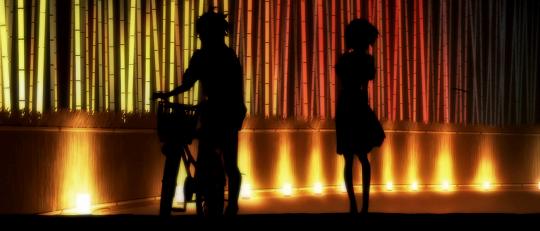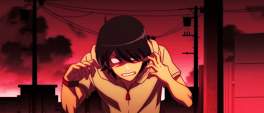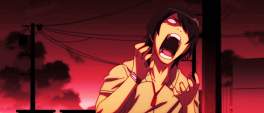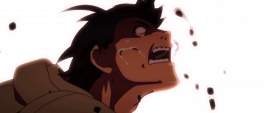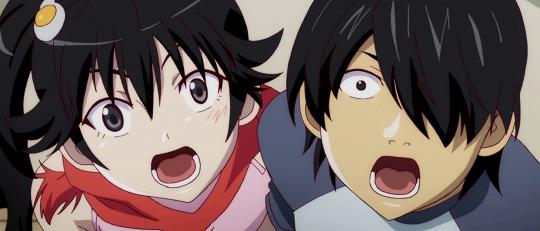Nisemonogatari is a very understanding series. It understands the difference between pornography and eroticism is a fine line and gyrates provocatively on the latter side. It understands that by emasculating the protagonist and slavishly worshipping the otherwise entirely female cast it champions misandry over feminism. It understands family members transcend the commonly held notions of love and hate and that often reason and logic don't apply. It also understands, and this is crucial, that as a phenomenon, the Monogatari franchise (including Bakemonogatari before and the upcoming Kizumonogatari film) are fleeting. And damned if it isn't going to burn magnesium bright while it can.
All the pieces from Bakemonogatari are in place here: art and animation that sucker-punch the retinas, banter that strafes wit and tedium and a supernatural affliction story framework for support. Like Akiyuki Shinbo's previous role as director with studio SHAFT the production is, sometimes pompous, but always slick and confident and plays strongly to the intended audience. Specifically, eroticism for otaku. Not the flesh markets that series like Queen's Blade, Yosuga no Sora or Ladies versus Butlers are, but understanding how to titillate rather than satiate and the confidence to put the story on hold for an episode to indulge in this.
It's still smutty and deviant for sure, but it's fathoms from Nadeko disrobing in Bakemonogatariand here only the exhibitionist Suruga is exposed for giggles. Even the extended bath scene with the ever young Shinobu - deliciously voiced by Maaya Sakamoto - comes across as familial rather than perverse. It's that familial connection which underpins the entire series and makes it thematically stronger than its scattershot predecessor.
Marginalising fan favourite Senjougahara was a smart move as it limits her obnoxious domineering and allows the bond between Araragi and his sisters Tsukihi and Karen to take the fore, making the two overarching stories - Karen Bee and Tsukihi Phoenix - much more potent. No clearer is this than in the penultimate episode when, as the audience, we are privy to why the two antagonists have visited Araragi's house yet he is oblivious. When the attack on his sister comes it is swift and brutal and from Araragi there is no pithy comment, no monologues or diatribes, just red mist and fury. It speaks volumes of the relationship with his siblings, more so than any of the extended speeches do.
Unfortunate then that speeches are what define the climaxes to both stories. Standing around and trading sentences, regardless of how you package it, falls short of what should be a satisfying fulfilment to weathering the barren patches of story. Ameliorating this there are visits with past characters, Hachikuji seems to be the favourite despite her relative two-dimensionality. These interludes are conspicuous for stalling an already protracted plot, and were it not for the dialogue and animation's boundless enthusiasm, these would be all but intolerable.
Similarly so for Araragi whose only lot in life seems to be pandering to the bevy of females that orbit him. Amusing though it is to watch him be humiliated by Senjougahara, fawned over by Nadeko, put down by Hanekawa and stripped of his masculinity by Karen, it would otherwise be pathetic and borderline creepy with such a sycophantic lead. Araragi takes the role of both verbal and physical punching bag with aplomb but other males do little better: Kaiki is a sickly looking con-man who extorts children for money and Oshino has all the trademarks of a wayward father by leaving his protégé without a word. This then is faux feminism by juxtaposition with the strong, demure, smart, young, sporty and witty traits doled out evenly to different cast members - pick your perversion and start salivating.
This is a series for fans of anime as a medium and not for any specific niché. It inspires slavish devotion and cultish adoration because it has passion circulating in its veins - it's in the animation, the direction, the script and the music. It's certainly not in the characters or story which if penned by any other director or studio, would collapse like a flan in a cupboard. It is fervour an audience can get caught up in, stow your ambivalence and caution by the door. It isn't for everyone but that's not through lack of trying. Some will see the lack of story progression or archetypal personalities and rightly baulk, others will ride that passion over the cracks and chasms hiding under the surface.
Nisemonogatari knows it is short lived - sooner or later you need more than just chutzpah to sustain yourself. Until then though it is will blaze in technicolour, a sometimes funny, sometimes uncomfortable, sometimes picturesque love letter to fans of an oft maligned medium.
